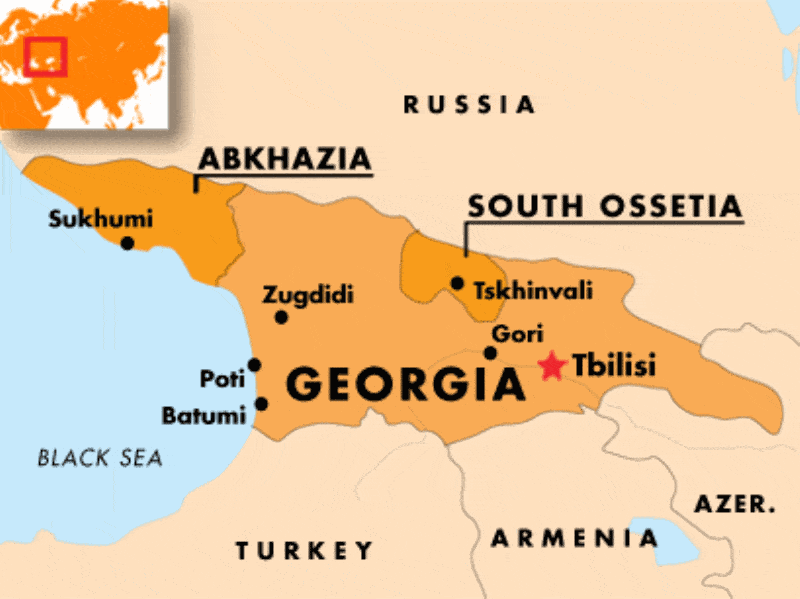
Mikheil Saakashvili
When discussing Georgia, most Americans (if they realize you are not talking about Atlanta) will laud the democratic achievements of that former soviet republic. To many, American-educated Georgian President Mikheil Saakashvili and his National Movement party stand as an example of democratic ideals reshaping a former communist enclave. In the three years since the “Rose Revolution,” which swept him to power, there can be no doubt that Saakashvili has made progress in securing Georgia’s borders, improving services, and decreasing corruption.
Flush with US aid dollars, Saakashvili has done much to modernize the Georgian military and to make Georgia a US strategic ally. Moreover, Saakashvili has virtually eliminated the power outages and natural gas shortages that were a staple under his predecessor, Eduard Shevernadze. However, Saakashvili is also continually haunted by regions which no longer wish to be part of his country – Abkhazia and South Ossetia. There had also been a third “breakaway region” just months into Saakashvili’s presidency – a situation that was narrowly averted and the region was brought back within the country’s folds.

The Rose Revolution centered mostly on anti-corruption issues, sparked by the rigged elections of November 2003. Once in office, Saakashvili immediately replaced the high-level officials of Shevernadze’s regime with younger politicians who wholeheartedly supported the new government. These new officials were mostly in their mid-thirties and had graduated from university as the Soviet Union was collapsing but then remained relatively idle for a few years having little or nothing to do with Georgia’s civil war (ca. 1988-1993) that was fought mostly along ethnic lines. Most of these officials had either left for the United States for education in law or had stayed in Georgia and worked in opposition activities against Shevarnadze. Interestingly, most had, by the end of the nineties, briefly garnered jobs in Shevarnadze’s “reforming” government, but quickly became disenchanted by the corruption they found there.
Officials in Saakashvili’s government have proved unflappable in their political solidarity. Although there have been numerous “reshufflings” of cabinet ministers, reshuffling is all Saakashvili seems able to do; he seems incapable of permanently dismissing a minister. This is likely because he fears that any show of disunity could hurt the fledgling administration. Thus, the backgrounds and recent behavior of these officials all converge on two alarming tendencies: general inexperience and a political solidarity that is upheld even when doing so hinders governmental transparency and obstructs justice.
The Murder of Sandro Girgvliani

Sandro Girgvliani
In a recent and unresolved case, the head of the Ministry of Internal Affairs (MIA), Vano Merabishvili, was implicated in a possible cover-up of the murder of Sandro Girgvliani. In late January, Girgvliani and a friend argued with Girgvliani’s girlfriend in a bar hosting a high-ranking MIA official’s birthday party. In the process, they disparaged some MIA officials. Upon leaving, the two were forced into a Mercedes and taken outside of Tbilisi where Girgvliani was beaten to death. The friend escaped. Initially, the investigation inched along. It was not until opposition politicians intervened that four low-level MIA employees were arrested and found guilty.
During one of my first days working at a Georgian NGO this summer I witnessed a press conference where members of Girgvliani’s family pleaded for a thorough and transparent investigation. To many, the scandal demonstrates that the Rose Revolution has done little to stamp out corruption. Regardless, Merabishvili has continued to obstruct any investigation of higher-ranking MIA officials, a move that has prompted many to call for his resignation.
Although there is no conclusive evidence linking the upper echelon of the MIA and Girgvliani’s murder, the situation above testifies that the ministry has been less than forthcoming in their investigation. The ruling party, including President Saakashvili, has been quick to support Merabishvili and the MIA. Is it pragmatic loyalty by a young, inexperienced staff who are trying to hold the young government together, or is it a destructive, ill-advised cronyism that corrupts the system for the party’s benefit?
Akhalaia’s Struggle to Administer the Prison System
In another recent case, twenty-five year old Bacho Akhalaia, recently appointed Chief of the Prison System, was implicated in a scandal involving a prison riot that left seven inmates dead and many others wounded. The official story is that the riot was planned by prison crime bosses in a bid to take control of the facility, but officials were able to use force to put down the rioters. However, that force left seven inmates dead, and the Georgian Parliament has been unwilling to launch an independent investigative probe. Furthermore, the government sealed off the prison for two days after the riot for opaque reasons, which brought the official story into still more doubt. Prisoners that witnessed the riot have stated that it had spontaneously broken out due to subhuman living conditions and the type of brutal treatment that left the seven inmates dead.
I recently met Bacho Akhalaia at a dinner party. His demeanor, sunken eyes, and anxious posture was an immediate signal the prison scandal and fears of retribution from inmates’ families had put considerable strain on this young man, who had a pistol tucked into the back of his pants. Akhalaia and I are both twenty-five and both new to the legal community. But the comparisons stop there, I have never been asked to shoulder the responsibility of a decaying government agency while simultaneously fearing for my life. It is safe to say that “Chief of the Prison System” was Akhalaia’s first major leadership role. Perhaps the riot was planned by crime bosses and effectively put down by prison guards. However, given National Movement’s united front in suppressing further investigations, it is difficult to come to a definitive conclusion.
What Does the Future Hold?
Georgia’s older generations seem to take the scandals and governmental opaqueness in stride. I would often ask cab drivers if they liked Saakashvili, the most common answer was – “ne ochen” (not a lot) and sometimes “nu, normalno” (he’s ok). Their indifference is understandable: while many realize their government is not a transparent democracy, most live much better today than at any other time in the last twenty-five years. However, many Georgians, mostly the younger generation, are seeking even better opportunities elsewhere. Although Georgia’s birth rate outstrips its death rate, the population is falling significantly due to emigration – very often men who take jobs abroad to send money back to their families who stay inside Georgia.
While most leave for economic reasons, others realize there is much more at stake. While enjoying a drink with a Georgian friend of mine, Zurab, who is also an academic, author, and was one of the first Fulbright Scholars to study in the US following the collapse of the USSR, he lamented that the government’s “shlishkom molodezh” (excessively young members) could not grasp the negative impact that government cover-ups and party collusion would have on the development of Georgian democracy. What this otherwise proud Georgian said next surprised me, “I have to get [my son] out of this country, somewhere in the West.”
* * *
Perha



